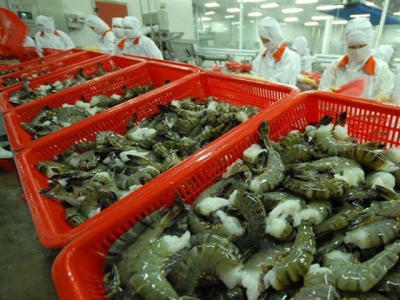Việt Nam to promote shrimp exports to EU next year

HÀ NỘI - The EU is a potential market for Việt Nam's shrimp industry next year because it is the largest shrimp market in the world, while the shrimp production of this bloc has not met its demand, according to domestic seafood experts.
Việt Nam will promote shrimp exports to EU next year. Photo baodautu
If the domestic shrimp industry takes advantage of preferential tariff and implements rules of origin under the EU-Vietnam Free Trade Agreement (EVFTA), Việt Nam's shrimp exports to the EU will increase from next year, said Trương Đình Hòe, general secretary of the Việt Nam Association of Seafood Exporters and Producers (VASEP).
Hòe said, according to the EVFTA signed on June 30, 2019, the tariffs of most raw shrimp, including fresh, frozen and chilled products, imported from Việt Nam into the EU will be reduced from the basic rate of 12-20 per cent to zero as soon as the agreement comes into effect, expectedly next year. Meanwhile, import tariffs of processed shrimp will fall to zero after seven years.
With those tariffs, Việt Nam has many advantages in exporting its shrimp products to the EU, according to the association. Currently, the EU accounts for about 31 per cent of total world shrimp exports and 22 per cent of Việt Nam's shrimp exports.
To take advantage, the VASEP said that immediate and long-term requirements are to create a certified shrimp supply with competitive prices and build a Vietnamese shrimp brand.
Therefore, the shrimp industry needs help from the Ministry of Agriculture and Rural Development and the General Department of Fisheries to control the shrimp farming process and prevent the use of banned chemicals during production. The sector also needs assistance in re-arranging shrimp farming areas and creating large-scale farms and cooperatives according to international aquaculture standards.
It should also take advantage in reducing import tariffs of high-class processed food from the basic rate of 20 per cent to 7 per cent under the Generalised System of Preferences Treatment (GSP) that is the tariff for developing countries.
For example, the EU’s basic import tariff of 20 per cent is imposed on boiled shrimp product of all countries, but the rate for the Vietnamese boiled shrimp is only 7 per cent under the GSP tariffs. This will increase competitiveness for Vietnamese boiled shrimp and also being a higher value for this product. The advantage will increase the purchase price of raw material, leading to more income for farmers. The farmers will have funds to improve the quality of raw material under international standards.
The Việt Nam Trade Office in Belgium said Vietnamese export enterprises need to have information on EU standards if they want to enter this market. Shrimps can only be exported to the EU if they are from countries licensed to export to the EU and farmed at registered farms with EU certifications.
The businesses need to comply with EU food labelling regulations to ensure consumers receive the information they need to make decisions when buying food, including product names and lists of ingredients, including additives.
According to the General Department of Fisheries, shrimp prices have increased again because the EU is promoting seafood in the last months of 2019. However, exports to this market in the second half of the year could not recover as expected.
The VASEP said Việt Nam’s shrimp export value in the first 10 months this year decreased by 6.4 per cent year-on-year to US$2.78 billion. The reduction was due to high supply at home and abroad. Meanwhile, lower demand and high supply in the world market also contributed to the drop in the global export price.
Việt Nam’s shrimp exports to the EU fell by 20.8 per cent in the first nine months, of which exports to the UK dropped 14.4 per cent, to Germany by 5.8 per cent and to the Netherlands by 40.8 per cent.
Có thể bạn quan tâm
 Walmart uses blockchain to track Indian shrimp exports to US
Walmart uses blockchain to track Indian shrimp exports to US The pilot project is the first known use of blockchain to track shrimp exports from the farmer to an overseas retailer.
 Vietnam boosting pangasius exports to China as sales to US tumble
Vietnam boosting pangasius exports to China as sales to US tumble Vietnam’s pangasius exporters are focusing more on Chinese market as their sales to the United States continue to spiral downward.
 Viet Uc to build its first shrimp processing plant next year
Viet Uc to build its first shrimp processing plant next year Vietnam’s leading supplier of shrimp postlarvae, Viet Uc Seafood, now plans to become a shrimp exporter, with its first processing plant being constructed